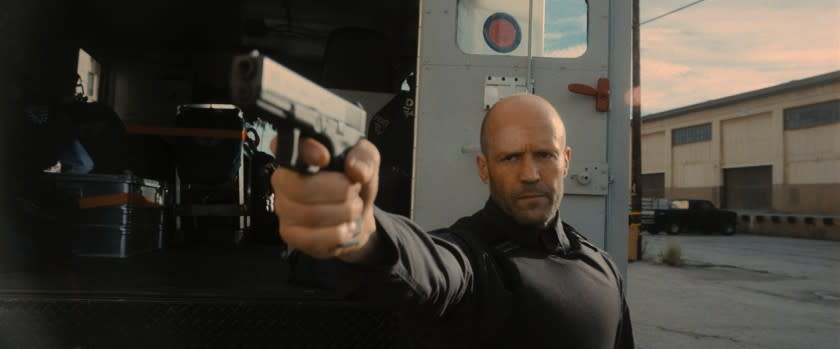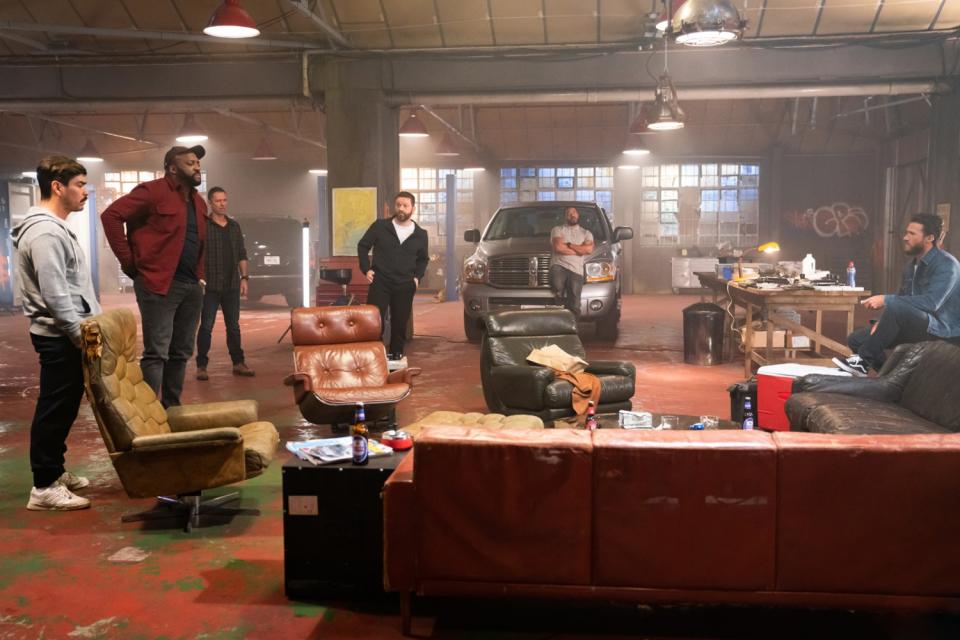Review: Guy Ritchie, Jason Statham, guns and mayhem are lethally reunited in 'Wrath of Man'

The Times is committed to reviewing theatrical film releases during the COVID-19 pandemic. Because moviegoing carries risks during this time, we remind readers to follow health and safety guidelines as outlined by the Centers for Disease Control and Prevention and local health officials.
Guy Ritchie’s “Wrath of Man” has a proper opening credits sequence, with classical illustrations of angels, lions and other dramatic biblical scenes juxtaposed over slow-motion images of anguished men, bass strings groaning relentlessly. It’s time for some heavy-duty masculine myth-making melodrama, a fable of men, guns, tragedy and revenge; a burly, entertaining entry into the “dudes rock” cinematic canon, as imagined by Ritchie in rare form.
Set in the world of Los Angeles armored-truck robberies, “Wrath of Man” feels a lot like Guy Ritchie’s version of "Heat," or, more precisely, his take on the juiced-up “Heat” riff "Den of Thieves." It’s a remake of director Nicolas Boukhrief's 2004 French film “Le Convoyeur” (Cash Truck), which Ritchie adapted with Ivan Atkinson and Marn Davies. “Wrath of Man” also reunites Ritchie with star Jason Statham for the first time in 16 years (since 2005’s "Revolver"). When Ritchie burst onto the scene with 1998’s “Lock, Stock, and Two Smoking Barrels” and 2000’s “Snatch,” Statham was integral to Ritchie’s tough, sneering style. One could say that the two made each other stars.
So “Wrath of Man” feels like a homecoming for director and star, and an evolution, too. With Statham in the lead, playing one of his classically taciturn and tactically lethal action heroes, Ritchie is as restrained and controlled as he’s been in years. Utilizing the core creative team of his past few films, including cinematographer Alan Stewart, editor James Herbert, and composer Christopher Benstead, every element works splendidly in concert. Perhaps Statham was the missing piece.

Statham plays H, the new guy at a Los Angeles-based armored-truck company, Fortico, where the drivers have come to see themselves as prey for increasingly brazen predators, bands of highly trained thieves dressed like construction bandits or motorcycle gangs who rob the trucks in broad daylight and have no qualms about murder.
The quiet H stands out among the jocular and colorfully nicknamed drivers, who taunt and talk smack to one another. “Unflappable” doesn’t even begin to describe his ability to stay cool, calm and collected in the face of mayhem, inspiring some to describe him as a “dark spirit.”
Statham has cornered the market on performances that are stoic and lethal, and that’s all Ritchie asks of him in “Wrath of Man,” surrounding him with a murderers' row of beguiling character actors, allowing Statham to be the chillingly still eye of the storm. But Ritchie also allows the actor to mature a bit, to grow from a cocky young buck into a man carrying an unspoken burden that motivates his every move.
Chapter titles like “A Scorched Earth” and “Bad, Animals, Bad” lend a sense of heft and portent to Ritchie’s bloody modern legend, executed with a brawny, muscular élan. The plot is a puzzle box of twisting double-crossed timelines and loyalties, so to delve too far into the details would give too much away, and the film is far more engaging the less we know about the mysterious H and his mission. Suffice to say, there are more than a few armored-truck robberies, and although the motivations of the thieves are perfunctory, the only motivation that matters is that of H, the pained and bloodthirsty hero. The brutish aesthetic of “Wrath of Man” wrestles us into submission, and though it’s not exactly enlightened, or enlightening, it doesn’t necessarily need to be.
Katie Walsh is a Tribune News Service film critic.
This story originally appeared in Los Angeles Times.

